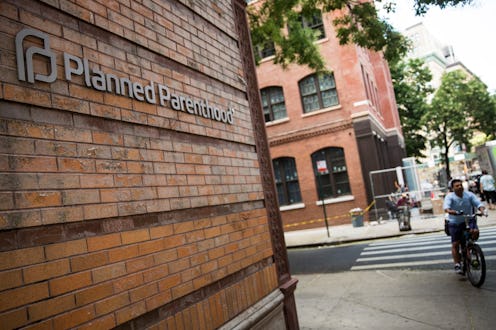News
Is Defunding Planned Parenthood Against The Law?
In the weeks following the release of "sting" videos targeting Planned Parenthood's fetal-tissue donation program, several states have gone ahead defunding the national family-planning organization, cutting off affiliated clinics from Medicaid funds that subsidize health services unrelated to abortion. So far, Alabama, New Hampshire and Louisiana have eliminated Medicaid funding for Planned Parenthood, with the latter's governor, 2016 GOP presidential candidate Bobby Jindal, flaunting his decision on the campaign trail. "It has become clear that this is not an organization that is worthy of receiving public assistance from the state," Jindal said of his decision in a statement last week. But as much as conservative leaders want to control funding to Planned Parenthood, one thing stands in their way — the federal government. On Wednesday, the U.S. government warned states that defunding Planned Parenthood may be a federal violation that comes some with some mighty consequences.
According to The Wall Street Journal, the Department of Health and Human Services contacted officials in Alabama and Louisiana over the loss of Medicaid funding, noting that canceling their state contracts with Planned Parenthood is a major federal violation. New Hampshire's decision to strip funding from Planned Parenthood is excused from federal oversight, because its newly passed measure only blocks state funding and doesn't affect Medicaid grants, The Wall Street Journal reported.
An HHS spokesperson also confirmed to Reuters that officials in Alabama and Louisiana were contacted through the Centers for Medicare & Medicaid Services. The spokesperson said these two states — and others who are currently thinking about eliminating funding to the family-planning organization — would be restricting access to much-needed health services provided under Medicaid.
Planned Parenthood confirmed this news on Wednesday, praising it as a reproductive health victory. The organization's executive vice president, Dawn Laguens, said it was "good to hear that HHS has clarified what we already know" — that restricting Medicaid funds for family-planning services is against the law.
"Politicians in Arizona, Indiana, and elsewhere have tried — and failed — to do the same thing," Laguens said Wednesday in a statement sent to Bustle. "This political grandstanding could have real and devastating consequences for women who rely on Planned Parenthood for birth control, cancer screenings, STD tests, and other lifesaving care."
Laguens added that Planned Parenthood "will do everything in our power to protect women's access to health care in all fifty states." Currently, Planned Parenthood clinics comprise just 10 percent of the roughly 4,100 publicly funded family-planning clinics in America, according to research from the Guttmacher Institute. When looking solely at clinics receiving Title X grants, Planned Parenthood centers account for 13 percent.
Still, Planned Parenthood clinics continue to be leaders when it comes to providing family-planning services, whether for residents of urban neighborhoods or rural areas. According to Guttmacher, Planned Parenthood serves an overall 36 percent of patients who receive family-planning services through a publicly funded health center. And when it comes to Medicaid patients, Planned Parenthood is also the overwhelming provider for low-income patients.
Women over the age of 15 are also more likely than men to use Medicaid services. According to the Kaiser Family Foundation, 33 percent of Medicaid beneficiaries with full benefits are women, while only 20 percent are men (children make up the largest share, at 47 percent). Kaiser research also found that 70 percent of those women receiving full Medicaid benefits are of reproductive age.
It's important to note that, under the Hyde Amendment, these Medicaid funds don't provide abortions except in cases of rape, incest or mother's health and life. Planned Parenthood says these federal grants subsidize services such as contraception, STI testing, cancer screenings and other preventative measures. In fact, subsidizing these preventative measures may save Medicaid money in the long run. HHS cites research showing that nearly $4 was saved on every public dollar spent on contraception services in 2008. This money would have gone to Medicaid expenses for pregnancy and childbirth.
While New Hampshire may be off the hook (for now), there are several other states, most of whom are notorious battlegrounds for abortion rights, that need to proceed with caution in the following weeks. Politicians in Georgia, Wisconsin, Pennsylvania and Ohio have made it clear in recent weeks that they would seek to block Medicaid funding to Planned Parenthood centers in their states. If states do go ahead and eliminate Medicaid funding to Planned Parenthood, they would need to hold a federal hearing, which may not bode well for Planned Parenthood foes. As Laguens previously mentioned, federal courts have sided with the Obama administration in the past in the cases of Arizona and Indiana, which both failed to strip total funding from Planned Parenthood centers.
